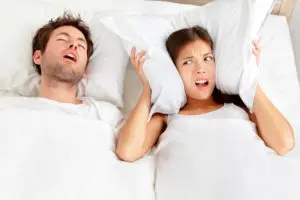05 Feb Do I Have Sleep Apnea If I Snore?
 For many of us, snoring while sleeping is little more than a slight disturbance to those who may be sleeping around us. When snoring occurs, even the noisiest variety, there is typically no need to be alarmed unless the snoring is accompanied by the symptoms of sleep apnea.
For many of us, snoring while sleeping is little more than a slight disturbance to those who may be sleeping around us. When snoring occurs, even the noisiest variety, there is typically no need to be alarmed unless the snoring is accompanied by the symptoms of sleep apnea.
In fact, snoring is separated into two categories in order to differentiate between the harmless variety and the more serious variety. Primary snoring describes the loud noise that is made due to heavy breathing or vibrations within the nasal passages and the throat while sleeping. Apneic snoring, on the other hand, describes a pattern of interrupted breathing during sleep.
Patients who suffer from apneic snoring are described as producing a very loud snoring sound followed by a notable period of silence. It is during this time of silence that the ability to breathe oxygen is hindered, and the body is forced to awake momentarily in order to gasp for air. The patient may experience a restless sleep or an inability to enjoy deep levels of sleep for an adequate period of time.
Patients who have lived with sleep apnea for an extended period of time may not even realize that the condition is present, since the snoring sounds and gasps for air during the night may be easily forgotten once the morning comes. Instead, these patients may find themselves battling the related consequences of sleep apnea. These include constant drowsiness during the day, irritability, increased blood pressure, or feeling startled and unsettled upon waking up.
Identifying the cause of this sleep disorder will typically lead you towards the appropriate treatment solution. Generally, apneic snoring is caused by a blockage or a restricted airway as you are asleep. This may be due to weight gain, large tonsils, gender, or even a family history. There is also an increased risk for sleep apnea later in life.
This condition can be treated by an experienced oral surgeon, and patients can once again enjoy a quality night’s sleep and improved health.
Contact Great River Oral & Maxillofacial Surgery to schedule an oral surgery consultation to learn more about the treatment options for sleep apnea.



